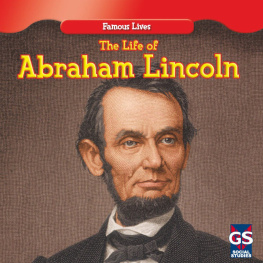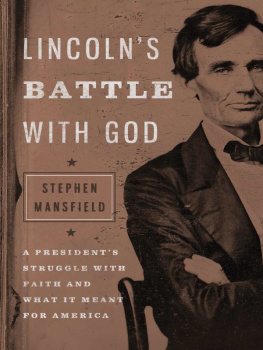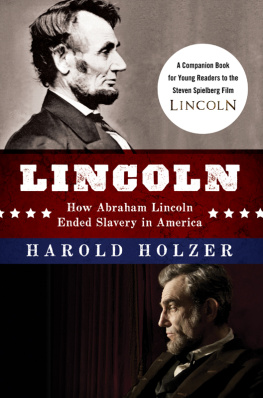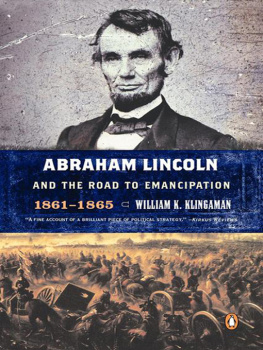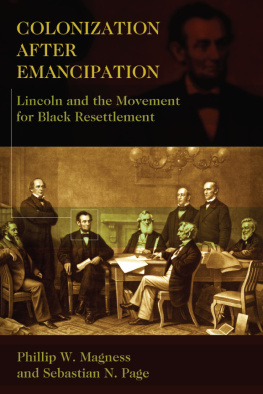Abraham Lincoln, the Quakers, and the Civil War
A Trial of Principle and Faith
William C. Kashatus

Copyright 2014 by William C. Kashatus
All rights reserved. No part of this publication may be reproduced, stored in a retrieval system, or transmitted, in any form or by any means, electronic, mechanical, photocopying, recording, or otherwise, except for the inclusion of brief quotations in a review, without prior permission in writing from the publisher.
Library of Congress Cataloging-in-Publication Data
Kashatus, William C., 1959
Abraham Lincoln, the Quakers, and the Civil War : a trial of principle and faith / William C. Kashatus.
pages cm
Includes bibliographical references and index.
ISBN 9781440833199 (hardcopy : alk. paper) ISBN 9781440833205 (ebook) 1. Lincoln, Abraham, 18091865Relations with Quakers. 2. United StatesHistoryCivil War, 18611865Religious aspectsQuakers. 3. QuakersUnited StatesHistory19th century. 4. Society of FriendsUnited StatesHistory19th century. I. Title.
E457.2.K365 2014
973.7092dc23 2014015667
ISBN: 9781440833199
EISBN: 9781440833205
18 17 16 15 14 1 2 3 4 5
This book is also available on the World Wide Web as an eBook.
Visit www.abc-clio.com for details.
Praeger
An Imprint of ABC-CLIO, LLC
ABC-CLIO, LLC
130 Cremona Drive, P.O. Box 1911
Santa Barbara, California 93116-1911
This book is printed on acid-free paper
Manufactured in the United States of America
Kashatus brings fresh insights into the interior life of Abraham Lincoln during the Civil War and shows that Quaker-established schools for free blacks were outstanding and necessary models for the work of Reconstruction that lay ahead.
Linda B. Selleck Author of Gentle Invaders: Quaker Women Educators and Racial Issues During the Civil War and Reconstruction
Abraham Lincoln, the Quakers, and the Civil War is a balanced treatment of Lincolns relationship with the Society of Friends, showing his respect for and attention to the Quaker delegations that came to talk with him during the Civil War.
James McPherson
Emeritus Professor, Princeton University
Author of Battle Cry of Freedom: The Civil War Era
I believe strongly in the message of this thorough study. In addition to their warm and practical interactions, Abraham Lincoln, the British, and the American Quakers experienced the same divine calling for the nation to become a people unified by the pain, doubts, and the depression of war.
Hugh Barbour
Author of The Quakers in Puritan England
Co-author of The Quakers
This is a fascinating look at an intriguing, long-neglected subjecthow Abraham Lincoln sought counsel and inspiration from the anti-war Quakers in the midst of the bloodiest war in world history.
Harold Holzer
Roger Hertog Fellow, New York Historical Society
William Kashatus's Lincoln, the Quakers, and the Civil War is an excellent piece of historical writing by an author who has deep insight into American Quakers. He offers fascinating insights into Lincoln's presidency, his anguish, and his spirituality while also illuminating a little-known aspect of the Great Emancipator's own fascination with Quakers.
Max L. Carter
Professor of Religious Studies, Guilford College, Greensboro, NC
For Sarah and Charlie,
devoted friends and steadfast Quakers
Contents
Acknowledgments
Abraham Lincoln, the Quakers, and the Civil War: A Trial of Principle and Faith is a collaborative effort that began in 1977 when I entered Earlham College in Richmond, Indiana. At Earlham, I met Sarah Mullen and Charles Northrop, classmates and fellow Quakers who quickly became my best friends. Despiteor perhaps because ofmy reclusive nature, Sarah and Charlie constantly pulled me away from Lily Library to visit local historical sites, participate in campus ministry, provoke others by dressing in Quaker garb, and, in our junior year, travel to England on a foreign study program and Quaker pilgrimage. They also challenged my intellect by reading my research papers, offering constructive criticism and engaging in thoughtful conversation. Most of all, they inspired me to become a better person by modeling Friends values. It was most fitting that they married shortly after graduation in 1981. Sarah and Charlie remain my closest friends. This book is dedicated to them with eternal love, respect, and affection.
It was also at Earlham that I had the good fortune to study with several professors who inspired my interest in history and religion, including Hugh Barbour, Max Carter, Peter Cline, Lillie Johnson, Tom Mullen, Randall Shrock, and D. Elton Trueblood. Not only did they give selflessly of their intellect and time, but did so with gentle good humor and constant encouragement. In the process, they taught me that what I learned at Earlham was not as important as how I learned it. I am extremely grateful to all of these professors for making the learning process so enjoyable. I can only hope that my own teaching and scholarship does justice to their example.
A personal debt of gratitude is owed to Tom Haviland and Bill Vaselopulos, my closest friends on Earlhams varsity soccer team between 1978 and 1980. Tom, a Quaker, was a huge supporter at a time when I had doubts about my abilities, both on and off the soccer pitch. Bill, a native of Chicago, was another confidant and the person who took me on my first visit to Lincolns home and burial site in Springfield, Illinois.
Special thanks are due to others who reviewed earlier drafts of the manuscript and provided constructive criticism including Hugh Barbour, emeritus professor of religion, Earlham College; Max Carter, campus minister at Guilford College; Christopher Densmore, curator of Friends Historical Library at Swarthmore College; Ruth Dobyns, curator of the Quaker Heritage Center at Wilmington College; Allen Guelzo, professor of history at Gettysburg College; Thomas Hamm, professor of history and curator of the Quaker Collection at Earlham College; Harold Holzer, senior vice president for external affairs at the Metropolitan Museum of Art and one of the nations leading Lincoln scholars; and James McPherson, emeritus professor at Princeton University and a leading Civil War scholar. Of course, any errors or shortcomings that remain are mine alone, as are the views presented herein.
Another group of folks provided invaluable research assistance by granting access to special collections, historical photographs, and/or family memoirs: James M. Cornelius, curator of the Lincoln Collection in Springfield, Illinois; Gwen Gosney Erickson, librarian and archivist, Guilford College, Greensboro, North Carolina; Joan Kimball, Philadelphia, Pennsylvania; Patti Kinsinger, archivist at the Quaker Heritage Center, Wilmington College, Wilmington, Ohio; Susanna Morikawa of Friends Historical Library at Swarthmore College; John Anderies and Ann Upton of the Quaker Collection at Haverford College, Haverford, Pennsylvania; and Christine Hadley Snyder, Clarksville, Ohio.
Finally, special thanks is owed to my family. My parents, Balbina and Bill, gave me the gift of a Quaker education, as well as their unconditional support in my decision to become a writer. My sons, Tim, Peter, and Ben, have tolerated my twin passion for history and writing all their lives. Some day they will hopefully understand, like their mother, Jackie. Words cannot adequately describe the love and respect I have for her.
Introduction
On the rainy morning of Sunday, October 26, 1862, President Abraham Lincoln was visited at the Executive Mansion by a small delegation of the Religious Society of Friends. In the past, he had entertained many similar interviews from religious groups, who came to offer political advice under the guise of divine authority. Occasionally, a minister even had the presumption to request an appointment. Although Lincoln was compelled to endure such meetings, he detested them. On the other hand, he had infinite patience for those who called on a genuinely spiritual mission. Such was the case with four QuakersEliza P. Gurney, John M. Whitall, Hannah B. Mott, and James Careywho were deeply affected by the trials of the Civil War and felt a special sympathy for the president in his position of overwhelming responsibility.


